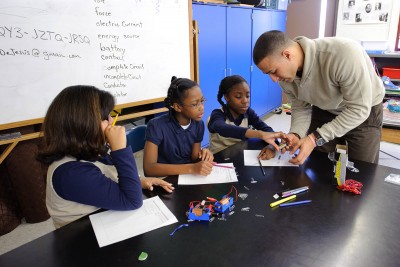
Neag School of Education faculty member Catherine Little received a $2.5 million grant from the U.S. Department of Education’s revitalized Jacob K. Javits Gifted and Talented Students Education Program to better serve gifted and talented students being stymied by extreme poverty, race, disabilities or other barriers.
It was the largest Javits award given to a single researcher this year.
“When we talk about the achievement gap, our focus is generally on the lowest-performing students. But there’s also an excellence gap showing differences based on student demographics at high-performing levels, indicating barriers to high performance for students from economically disadvantaged backgrounds,” said Little, an associate professor in Educational Psychology. “The potential for excellence exists among all populations. But to date, we haven’t done a very good job finding and serving them.”
Guided by the successful Young Scholars Model used in Fairfax County, Va., researchers in Little’s study–called Project SPARK (Supporting and Promoting Advanced Readiness in Kids)–will help teachers screen and support kindergarten, first- and second-graders in 24 diverse schools in Connecticut, Massachusetts and Rhode Island.
They’ll pay particular attention to Latino and African-American students, who represent just 26 percent of students currently enrolled in U.S. public school gifted and talented programs.
Other federal statistics show similar gaps for children with disabilities, who represent just 1 percent of students in gifted and talented programs.
Through Project SPARK, students who teachers and researchers identify as showing high potential will be invited to take part in specialized gifted and talented programs during the summer, where staff will provide a challenging academic curriculum designed to push students’ abilities.
Researchers will also work to provide teachers with ongoing classroom support and to promote students’ continuous growth.
The project, which could become a national model, is expected to involve up to 4,000 students and 300 teachers, who will receive ongoing professional support from researchers on Little’s team, as well as Dr. Carol Horn, who directs Fairfax’s Advanced Academic Programs. Another key partner in the research effort, Dr. Jill Adelson of the University of Louisville, received her Ph.D. from UConn with emphases in Gifted and Talented Education and in Measurement, Evaluation, and Assessment.
“For all we know, the next Steve Jobs or person able to discover the cure for Ebola is sitting in a public school classroom right now,” Little said, “but is being overlooked because he or she is performing at grade level and seems to be doing just fine. But what if that student could do more than fine? What if, with the proper supports, that student could become a high achiever and exceed everyone’s expectations?”
“Kids are missing out on opportunities to discover what they’re capable of achieving, and our country is missing out on opportunities to tap into its people’s abilities,” she continued.
Projects like this that encourage students from underrepresented groups to excel in core subjects, and prepare for advanced coursework, are directly in line with U.S. Department of Education goals. According to U.S. Secretary of Education Arne Duncan in a U.S. Department of Education release on Javits funding, “This grant program will help these schools replicate success and challenge the opportunity gap for students who far too often are not given a fair shot at success in college, careers and life.”
In additional to the Javits award, the Neag School recently received a two-year, $2 million grant to establish the National Center for Research on Gifted Education at UConn. If the center meets all performance benchmarks, it will receive an additional $3 million over three years.
The Neag School has served as the nation’s gifted and talented education research center since 1990, when it was established by field pioneer and UConn Distinguished Professor Joseph Renzulli. The new Center is headed by Gifted and Talented Education Professor Del Siegle, head of the Neag School’s Department of Educational Psychology.
“So many things can limit a child and keep a child from achieving maximum growth,” Siegle said. “Our commitment is to finding ways to help ensure every child, from every background and circumstance, is able to go as far as he or she possibly can.”
 Facebook
Facebook
 Twitter
Twitter
 LinkedIn
LinkedIn
